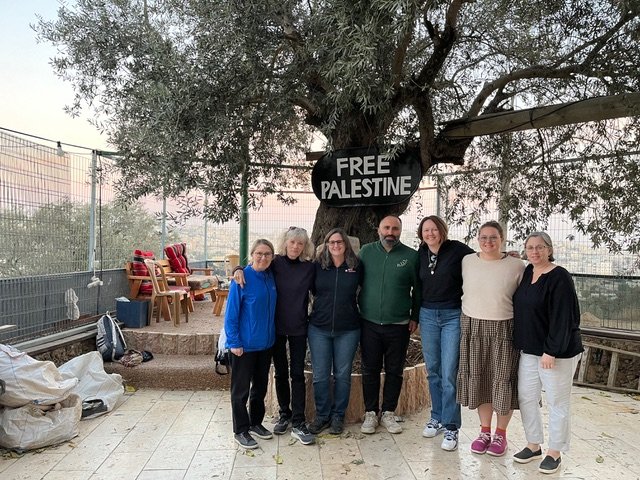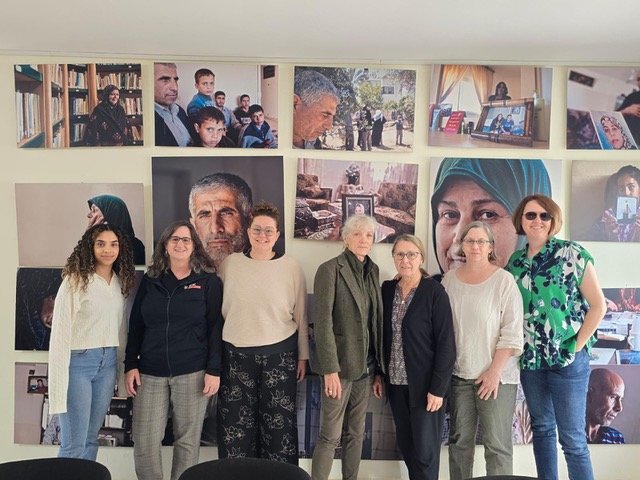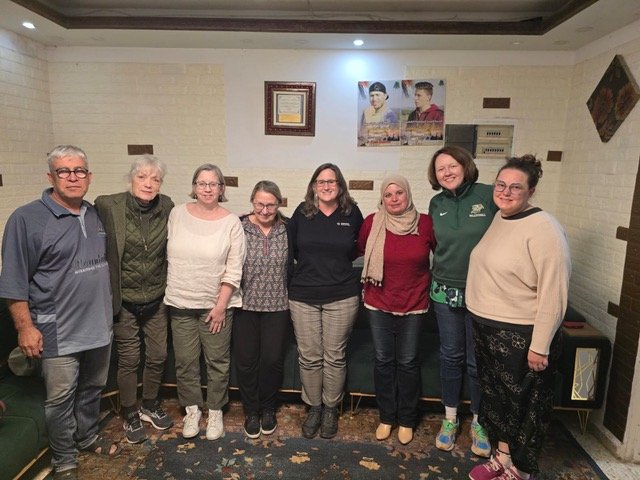Traveling through Palestine in an Upside-Down World




Shukran is Arabic for thank you.
As I fly home from my travels in Palestine, I feel deep gratitude for all I’ve been able to experience. I have such appreciation for the hospitality from Palestinians throughout the area, from Nablus to Hebron, Jericho to Jerusalem, Bethlehem to Ramallah and everywhere in-between. I’m filled with awe for the beauty of the land and the people who care for it - the olive trees that I was able to “help” harvest; the spices and savory food that filled me to overflowing; the stones that hold great history, from ancient times to today; and the “living stones,” those who have cared for this land and these sites for generations. It truly is awe-inspiring to meet with shepherds and hear from prophets as I watch the sacred stories of my faith continue to play out among an occupied people seeking space to live their lives, the ability to move freely, and opportunities for a future for themselves and their children.
In addition to my gratitude, however, I must also acknowledge the deep privilege I hold in being able to travel freely, with sufficient resources and very limited fear. The hierarchical spaces of power in which we live deny these freedoms to not only to Palestinians, but to the majority of the earth’s population. The oppression endured by Palestinians is a painful reminder of these global systems in which I, and everyone with these privileges, are complicit.
Sumud is Arabic for steadfastness.
Abu Saqr, a Bedouin shepherd from the Jordan Valley, serves as one example of sumud. (Courtesy of Allison Tanner)
This word encapsulates the perseverance Palestinians have shown as they’ve been forced to deal with 78 years of Israel’s aggressive attacks on their land, livelihood, culture, resources, villages and lives. Sumud is the refusal to let go of one’s dignity despite a constant barrage of harassment and humiliation. Such unjust treatment is woven into the fabric of society: having to wait hours a day at check points when they want to go anywhere; night raids on their homes from the Israeli military that can detain them, or their children, without giving a reason; attacks by settlers on their fields, animals, and homes; property demolitions because Israel is seeking to ethnically cleanse whole areas of their presence; lack of equal access to water or the ability to dig wells; not being given municipal resources to develop their neighborhoods, and much more. I started traveling to Palestine in 2017, and the escalation of attacks is undeniable: encroaching settlements, shrinking resources, constant harassment, and increased rates of detention and imprisonment, not to mention the rising death rates of Palestinians at the hands of the Israeli military, or the hundreds of thousands dead in Gaza.
Maqluba is Arabic for upside-down.
A server presents maqluba at the Casanova Restaurant in Bethlehem. (Courtesy of Allison Tanner)
Maqluba is a well-loved Palestinian dish in which the ingredients, once cooked, are skillfully turned upside down in a large pan, right before the final reveal of the prepared dish. As much as I enjoy eating maqluba, I’ve begun thinking of maqluba theology – the upside-down politics of Jesus in which the outcasts are the essential part of community and those in power are chastised for harms they cause to others. Palestinians are living in an upside-down world in which those in power over them get to claim victimhood. Palestinian human rights groups, prisoner support organizations, organizations that protest the imprisonment of children, and labor unions have all been officially labeled “terrorist.” The United States passed legislation (in the House) to remove charitable status for groups that support Palestinian rights, while organizations supporting the violence and illegality of settler expansion remain untouched. In many ways, it is an upside-down world for Palestinians and their allies. But it is just this type of upside-down world that Jesus addressed when he said, “the last shall be first and the first shall be last.” These were the realities that Mary sang about when she declared God’s way of bringing down the powerful and lifting up the lowly in Luke 1:46-56. Maqluba theology is what I cling to when the world feels upside-down and so far from God’s kin-dom.
From this trip, I will carry with me the deep gratitude I have for those who have welcomed me into their lives, cherishing this gift and taking responsibility for having received it. I will hold as an example the display of steadfastness I witnessed, knowing this will be needed as we protect one another from a barrage of attacks on human dignity in the months ahead. And I will find comfort in maqluba theology, knowing that the work of God, and indeed our work, is to turn the world right-side up, so that everyone is treated with human dignity, everyone has the opportunity to thrive, and everyone is held accountable for the ways they wield their power.


